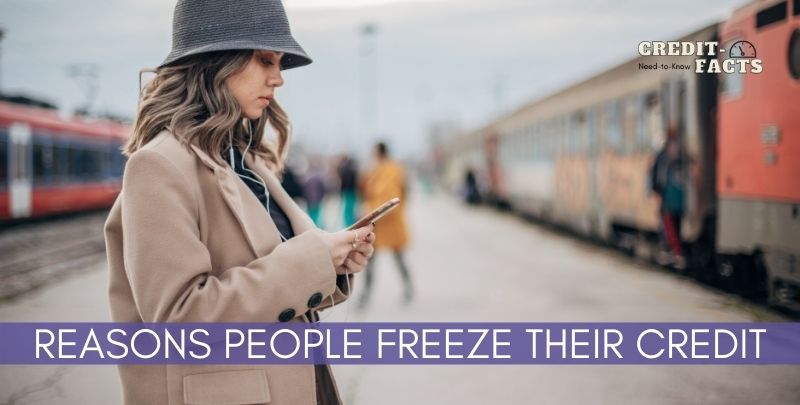You’ve been hearing a lot about freezing your credit lately, but what does it mean, and should you do it?
In the event of a data breach at a company that stores your personal information, freezing your credit will stop hackers from opening up any new lines of credit in your name.
You can also request to have frozen certain types of accounts if you know there has been suspicious activity on them. For example, if someone opens an account in your name and starts making purchases before you get the chance to dispute the charges with the bank or card issuer, then freezes can limit their ability to use those funds.
The process for freezing your credit varies by state and by the type of freeze you want to put on your credit report. Unfreezing or temporarily lifting a freeze can also vary depending on who’s making the request. Read on to see if freezing your credit is right for you.
 Here Are Six Reasons Why People Freeze Their Credit
Here Are Six Reasons Why People Freeze Their Credit
1. Identity Theft
You get the call that someone has stolen your identity! Maybe they used your social security number to apply for a credit card or gained access to your bank accounts. Or perhaps they found out your mother’s maiden name and used it to open up a checking or savings account in her name.
In the wake of a data breach, you may find that unauthorized accounts are being opened in your name. This does not just mean someone opened up a credit card or took out a bank loan. It also means they could be making purchases with those accounts and even applying for new lines of credit as you, too!
We’ve all heard horror stories about identity theft, but what if it happens to YOU? The first line of defense is usually freezing your credit so that criminals can’t open any new accounts. If someone tries to open an account and it is declined, they may think twice before trying again.
2. Data Breach
If you’ve been affected by a data breach, you may want to put a freeze on your credit. You never know what hackers will do once they’ve breached the company’s security that holds your information. Since you don’t know how many accounts or other pieces of personal information hackers got access to, it’s best to err on the side of caution and freeze your credit.
Prevention is the best cure! Putting a freeze on your credit can prevent cybercriminals from opening up new accounts in your name.
3. Lost Social Security Card
If you’ve lost your social security card, don’t panic—yet. You can ask for a new one by filling out this form and submitting it to the Social Security Administration.
However, if someone else could have found out your mother’s maiden name or where you were born from another source (and they know your social security number), then they could use this information to open accounts in your name. It is best to freeze your credit before that happens.
4. Losing Your State ID
Losing a photo ID with your information on it, such as a driver’s license or state ID, is a piece of bad luck. Criminals can easily use your information to apply for credit in your name even without knowing the answers to the standard security questions.
If your state ID gets into the wrong hands, it’s very likely to be sold on black market sites or used to open fraudulent accounts. If someone else starts applying for credit in your name before you’ve had a chance to freeze your credit, the damage can be extensive.
5. Housing Application
Many landlords and property managers have started requesting fingerprints as part of their tenant screening process. You can find out if your state allows this by visiting the Tenant Screening Background Checks Laws & Regulations page on the Nolo website. If it does, you’ll be at risk for identity theft if there is an error with your fingerprints.
While you are applying to rent a new apartment or for a mortgage, it’s best to freeze your credit so that nobody can open up accounts in your name. Later on, when you’ve found the right place and you’re ready to unfreeze your credit, be sure to check your reports.
6. Maintaining a High Credit Score
Freezing your credit will prevent unauthorized access to your reports. This will also prevent you from seeing accessing your personal credit reports. But you can rest assured, as long as it’s frozen, no one can open accounts in your name.
Criminals are always looking for opportunities to exploit you through credit cards or something else that will get the money. The best way to stop them is by freezing your credit so they won’t have access to your information.
Final Thoughts- To Freeze or Not to Freeze?
Freezing your credit will prevent unauthorized access to your reports.
How do you know if freezing your credit is right for you? It all depends on the risk factors in your life. If you’ve been the victim of identity theft before, it may be wise to freeze your credit so that criminals can’t open any new accounts in your name.
However, if you don’t feel that there’s much risk, it might be a good idea to unfreeze your credit every once in a while, to check your reports to make sure everything is still in order. But for now, freeze your credit to keep yourself safe from identity theft!


